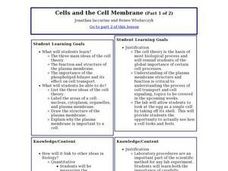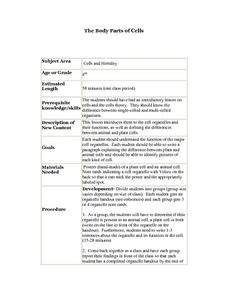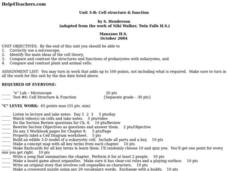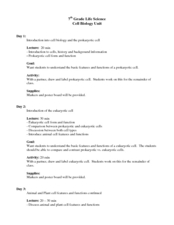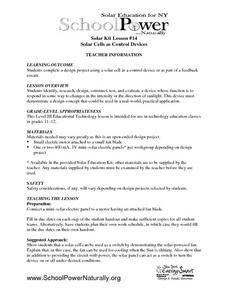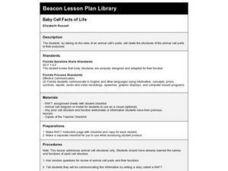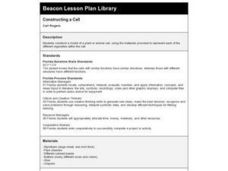Curated OER
Cells and the Cell Membrane
Students investigate the properties of cell membranes by isolating the membrane surrounding chicken eggs. They set up an experiment by placing eggs in a vinegar solution for three days. A powerpoint lecture emphasizes the structure of...
Garden Earth Naturalist Club
Parts of a Flower! Flower Dissection
Sometimes the best way to learn about plants is to see the different parts of a plant yourself. Groups of learners dissect flowers to answer questions about what they observe and what they wonder about their flower.
Teach Engineering
Cell Membrane Structure and Function
Teach your class how to get out of a cell — or break in. The third installment in a seven-part series introduces the class to cell membranes and their functions. The lesson plan includes information to present to the class,...
Curated OER
Variety Is the Spice of Cellular Life
Do you need to review animal cell structure? Investigate the ways in which different types of cells interact in a common human reflex. Your students can explore the functions of stem cells, consider various illnesses and assess stem...
Curated OER
Cell-to-Cell
Ninth graders use online tutorials, class discussion, presentations and scientific articles to explore types of cells along with cell structure, function and behavior. They explore ethical questions related to cells and disease.
Curated OER
Cell Parts
Students identify parts of a cell. In this biology instructional activity, students create a simulated cell by using Jell-o, fruit roll ups, raisins, gum drops, and M&M's. Students construct the simulated cell and identify each part.
Curated OER
The Body Part of Cells
Eighth graders are introduced to cell organelles and their functions and the they define the differences between animal and plant cells. They write a paragraph explaining the difference between plant and animal cells and students...
Curated OER
Cell Types and Parts
Eighth graders, after creating a Venn Diagram comparing/contrasting animal and plant cells, writing ten similes describing cell types, or drawing a colored diagram of a cell, list cell types as well as describe and label cell parts. They...
Curated OER
Introduction To Cell Structure and Function: What's Inside a Cell?
Tenth graders are introduced to the cell and some of its parts. Through the use of video, 10th graders see animal and plants cells and their parts. They learn terms used to explain the cell.
Curated OER
Cell Structure and Function
Students identify the main ideas of different cell theories. Using a microscope, they compare and contrast the structures and functions of prokaryotes and eukaryotes. They also compare and contrast animal and plant cells and complete...
Curated OER
Cell (Biology)
High schoolers conduct a series of activities to explore the nature of cells. In this biology lesson, students observe plant and animal cells under the microscope and compare them. They differentiate osmosis and diffusion.
Curated OER
Plasmolysis in Elodea Plant Cells
Students microscopically observe various subcellular components. They determine the effects of different salt solutions on Elodea plant cells. They detect the presence of chloroplasts, cell walls, and cell membranes of Elodea.
Curated OER
Solar Kit Lesson #14 - Solar Cells as Control Devices
Given four suggested concepts, emerging electrical engineers research, design, and constuct a working device that willrespond to changes in the intesnisty or the direction of sunlight. This is a challenge for learners to rise to, as the...
Curated OER
Regents High School Exam: Living Environment 2008
Tne New York Regents High School Examinations are comprehensive and include various styles of questions, includingmultiple choice and the analysis of graphs. This particular version, the 2008 Living Environment exam surveys a variety of...
Curated OER
Regents High School Examination: Living Environment 2003
The living environment, from the interior of a cell to the complex relationships among populations, are queried in this final examination. Learners look at air pollution maps, diagrams of cells, population graphs, and drawing of cells....
Curated OER
Regents High School Examination: Living Environment 2009
Emerging ecologists need a full understanding of life, from the inner workings of a cell to the complex relationships among organisms. This examination is meant to assess high schoolers after an entire year course on the living...
Curated OER
Baby Cell Facts of Life
Students examine the roles of an animal cell's parts, how each part relates to one another and then demonstrate their knowledge by writing a story about the animal cell structure.
Curated OER
Plant and Animal Cells: Alike and Different?
Seventh graders create a mneumonic device and a graphic organizer about the parts of plant and animal cells. In this biology lesson students are introduced to the parts of the cells and then work in groups to create projects that teach...
Curated OER
Constructing a Cell
Third graders, in groups, make a model of a plant or animal cells and represent each of the organelles in the cell.
Curated OER
The Cell
Students study the basic processes by which cells divide and transfer their genetic information. They recognize and distinguish possible inherited traits and through the discovery method of the facts and principles of inheritance....
Curated OER
Parts of a Cell Analogy
Middle schoolers reinforce comprehension of the parts of a cell. Theyl synthesize this content knowledge in a descriptive paragraph writing assignment.
Curated OER
Cell City
Students understand how various cell parts function and how they are related to the genetic process by creating a model and symbol to depict the function of the cell parts. They research a cell part to determine function and then cut...
Curated OER
Cell Me What?
Students compare and contrast the characteristics of robots and cells. In this biology activity, students examine the parts and function of cell organelles. They create a visual representation of their cell/robot analogy.
Curated OER
Cell Factory
Learners examine the basic structures and functions of cells. They design and construct a factory cell model where each factory part corresponds to a cell part.
